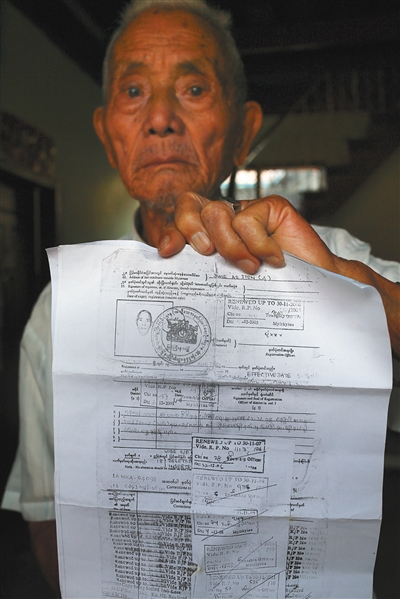
The expedition soldiers stayed in Burma for 70 years: I was the only one left when I lived.

Li Guangji has always been unwilling to join Myanmar nationality. He always takes an alien certificate and needs to pay taxes and seal every year.
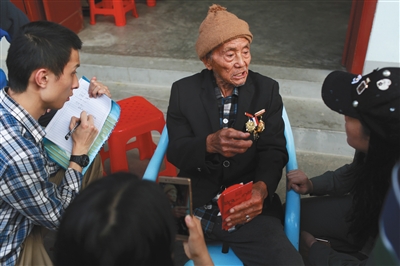
On April 4, Li Guangyi and volunteers from the veterans House told the story of that year.
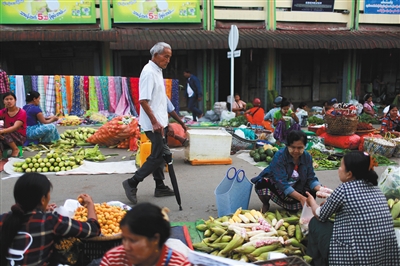
On April 5th, Li Guangyi walked through a vegetable market.
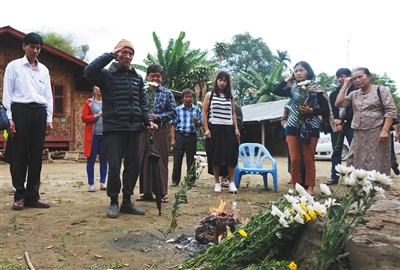
On April 5, Tomb Sweeping Day, Li Guangzhang worshipped at the cemetery of the 30th division of the former Chinese Expeditionary Force.
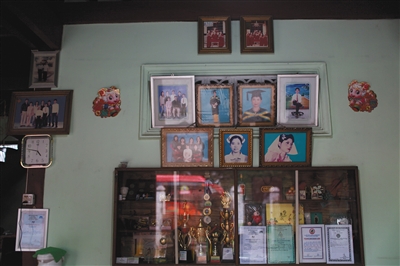
Li Guangyan is now full of children and grandchildren.
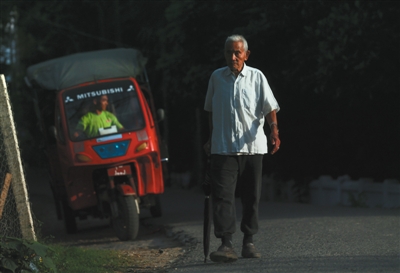
On April 5th, Li Guangyi went out for a walk. In addition to the particularly bad weather, he takes a walk twice a day, four or five kilometers per trip. A12-A13 edition Photography/Beijing News reporter Pu Feng
In April, the long rainy season is about to begin. On the streets of Myitkyina, Myanmar, people are enjoying a few sunny days.
Get off the main road, turn a few turns, and walk forward more and more quietly. At the end of the road, there is a small courtyard, two-storey building, Zhu Hong’s door and litchi trees, which have grown to the second floor. Chinese Rose are red flower bud, sunflowers are short, and the yard is full of the fragrance of grass and wood. Li Guangyi’s home has arrived.
The key to identifying his family is strong Chinese elements. Lanterns and couplets are the most common styles in China. Calendars are in Chinese, trees are bought from China, and even dogs are brought from Kunming.
The 95-year-old Li Guangzhen was sitting in the corner of the yard. He was afraid of cold, wearing a cotton-padded jacket and holding a crutch at hand. His eyes were big and bright, and he could not see that he had been soaked in bitter water at all. When the guest came, he stared at people and smiled.
At this age, he didn’t remember much about the events of a few days ago, but he did remember them clearly decades ago. The strong Yunnan accent, “we read books, Grade 4 and 5, just as we know, run out to be soldiers.”
In the 1940 s, he was inspired by “one inch of mountains and rivers, one inch of blood, one hundred thousand young people and one hundred thousand troops” and joined the Expeditionary Force. After the war, he left Burma and never saw his parents again. In the Myitkyina region of Myanmar, dozens of veterans had the same life track as him. Over 70 years, they all died and Li Guangyi became the “last”.
“My home is not found either”
Li Guangyi didn’t talk much. He was the most silent one when veterans gathered before. When taking a photo, he always lowered his head.
Sun Chunlong, the initiator of “veterans go home”, remembered his few exciting moments. In 2008, veteran Li Xiquan found his home and everyone was ready to send him back to China. Li Guangzhang, who had always been silent, suddenly grabbed Sun Chunlong and said timidly, “My home has not been found, and I have never been home.” At that moment, Sun Chunlong said that he suddenly wanted to cry and felt deeply responsible.
Li Guangji left home in 1939. Not long after the anti-Japanese War broke out.
He was only sixteen or seven years old. He was in the fifth grade of primary school in Xuanwei, Yunnan Province. The war broke out. Most of his classmates went home. He didn’t leave and signed up for the army.
Before joining the army, he didn’t go home to meet his parents or send them a message, so he didn’t go back. He comforted himself and would come back soon.
After a year of closed training, he went to Qujing and Yongping with the troops. In 1943, he was already the platoon leader of the second lieutenant artillery and was transferred to the Nujiang front line to guard the river. Then he participated in the great counterattack in western Yunnan. The worst hit that year was Battle of Mount Song.
In the war, death is a common trivial matter. When he mentioned the first battle of Songshan, he still shook his head, “too miserable”. The Japanese army came high and fired with machine guns. His comrades attacked one by one and were killed one by one. They fell down. The bodies were piled up in ditches-seeing people died one after another, he realized that his life was really as thin as a cicada’s wings.
He had a slender scar in the back of his head, which was also bruised by shrapnel on the battlefield and followed him all his life. Speaking of war, he slowly rubbed the small bulge.
In 1945, the News of the victory of the anti-Japanese War came that Li Guangzhen wanted to return to Xuanwei from Tengchong. Half of the time, I remembered that my identity as a Kuomintang soldier might not be able to go back. Back again, there was no way to go and entered Myanmar.
70 years in northern Burma
It was the 1940 s when the country was in chaos, and many irreversible choices happened at that time. Many doors closed gently, and the sound was too light to be heard. It would take a long time before people knew about it.
When she arrived in Myanmar, Li Guangzhen met a Yunnan woman named Yang zengfen. She was a good girl and fled to Myanmar. “virtuous, dignified and reasonable”, they became families, gave birth to a child and three women.
At that time, the status of Chinese in Myanmar was not high. There were only two choices, either to do business or to do hard work.
Li Guangji fought against famine and poverty with his survival experience during the war. He opened grocery stores, repaired bridges and repaired roads. At the age of 60, he was still digging Jade in mines and sowing seeds for survival in strange land. Finally, he raised all four children.
He had his own stubbornness, and let all four children go to Chinese school, read Chinese poems and write traditional Chinese characters since childhood. He received the most traditional Chinese education and lived in the Chinese way. So far, the eldest son Li Yuming has put Chinese songs in his car.
Li Yuming remembered that the hardest day of the family was in the 1990 s. The temporary residence permit in Myanmar is divided into regions. The temporary residence permit they took can only be carried out on the north bank of the enovardine River, while the political situation on the north bank is turbulent, the ethnic areas are an armed independent regime, and the family is hiding from Tibet.
The so-called temporary residence permit is the residence certificate of foreigners in Myanmar. Holders of this certificate need to pay taxes to the Myanmar government every year, and activities such as going out and doing business will be restricted.
It is not impossible to end this situation. As long as you are enrolled in Myanmar, all these restrictions can be solved. However, all members of the Li family have not been naturalized so far. When asked how to define his identity, Li Guangyi waved hand waving and told the reporter, “We are guests and guests in Myanmar.”
His family knew that he always wanted to go home. Back to China.
What id do you want?”
It is not easy to return home.
For a long time, “expeditionary force” was a sensitive word in Myanmar. A research expert on the battlefield of China, Myanmar and India said that Myanmar was previously a British colony. At that time, expeditionary forces entered Myanmar because they supported Britain, so they were regarded as invaders.
In the first two decades in Burma, Li Guangzhen never mentioned his experience of joining the army to his children. It was not until the eldest son Li Yuming was fifteen years old that a veteran organization found him that he said a few words lightly. And Strictly remind the child not to say it out.
In the 1990 s, this concept gradually loosened, and the mainland was also opening up. Li Guangzhen returned home with his wife and son. When he arrived at Xuanwei, his wife had a sudden gastric perforation. When Xuanwei died and was cremated, he had to rush back to Myanmar with ashes. From then on, I became a vegetarian.
In 1997, he brought his son back to China again, thinking that he would move the big family back to Yunnan and never return to Burma again. He successfully got his ID card, but the public security organ replied that the four children grew up in Myanmar and could not be identified as Chinese. He didn’t want to live alone in China, so he had to return to myitina in mourning.
A daughter settled in Taiwan, and he wanted to visit Taiwan for a while. Taiwan asked him to provide his credentials when he joined the Army. Speaking of this, he was excited and asked five times, “We are the soldiers of China’s anti-Japanese War. What documents do we need?”
He looks a little disappointed. It was a sense of loss that was not recognized. “Kuomintang” and “anti-Japanese War” all became his burden. No one cared about the thousands of miles they walked in the gunfire and the pile of corpses.
He had to write his resume on a piece of paper and sealed it well. Whenever someone came, he took it out and showed it to others. The first sentence above is, “veteran Li Guangyi, native of Huidong Village, Xuanwei county, Yunnan province”. Getting older, he said he could only use this to prove his identity.
He was so excited that after reading his resume, he pulled another iron sheet case out of the bed. He brought the box from China. Some years ago, it was full of holes and green on the surface. Open it to reveal a golden medal, with five-pointed star, peace dove and olive branch shining on it. It was Commemorative Medal of the 60th anniversary of the victory of the Chinese People’s Anti-Japanese War.
In 2005, the 60th anniversary of the victory of the anti-Japanese War, the Chinese embassy in Myanmar handed over the medal to him. Therefore, he was comforted. Once a guest visited him, he would take it out and put it on for others to see.
Forever Stranger
On Tomb Sweeping Day, Burmese Chinese also took a day off. Li Yuming took willow branch and elm branches and went to sweep the tomb for his mother. It is the custom of Yunnan to stand the branches around the tombstone. They have been preserved till now.
In the Chinese Cemetery, Li Guangji set up a tall multi-burial tomb for himself and his wife, a pair of couplets with strong words, and wrote on the book-“The History of expeditions in foreign countries has a long and heroic record, it is true that the white hair will remain unchanged”.
Li Yuming said that his father knew that he might not be able to go back and was going to be buried in myitina a hundred years later. The epitaph has been written, with a total of 300 words, half of which are talking about his experience of throwing troops, training and moving around in various battlefields.
At dusk, the sun was shining like a golden thread on the banks of the enovardine River, and the gold powder of the line was scattered on hundreds of Chinese tombstones.
In the cemetery, the tombstones of other expeditionary forces also wrote long epitaphs, read them carefully, and it was also a story of chaos in the era of the beacon.
They all cared about their native land. Deng Ding, another deceased Henan expeditionary force, built a house exactly the same as his hometown in myitina with the memory in his mind. His son Deng Gong marked that in the early 80’s of last century, his hometown wrote a letter for the first time. His father held the thin two pages of paper and cried “whining” alone in the corner of the yard.
Getting angry, Deng Ding always frowned and the angry Henan accent came out, “without you little bastards, I would have gone back to Henan long ago.”
Their stories all started from China in the 1930 s and 1940 s, crossed thousands of mountains and rivers, and finally ended up in a small town in northern Burma. Beyond the Mountains and Rivers, it was their hometown, but they didn’t go back alive.
Li Guangying, who lived the longest, can’t help thinking about the past like a movie. He told his son Li Yuming that what he remembered most clearly was that there was a fishing pond behind the school when he was young and a stone cave in Xuanwei Mountain, where he often played with his companions.
After such a long period of time, what he often touched most was these, the happiness of his childhood and the mountains and rivers in his hometown.
Many years ago, he was a little boy, sitting quietly by the river in his hometown, staring at the water, holding a fishing rod in his hand.
A12-A13 Edition collection/Beijing News reporter Luo Ting intern Zhang Shichao Yunnan Tengchong and Myanmar Myitkyina report
5354
Li Guangji has always been unwilling to join Myanmar nationality. He always takes an alien certificate and needs to pay taxes and seal every year. On April 4, Li Guangyi and volunteers from the veterans House told the story of that year. On April 5th, Li Guangyi walked through a vegetable market. April 5, Qing